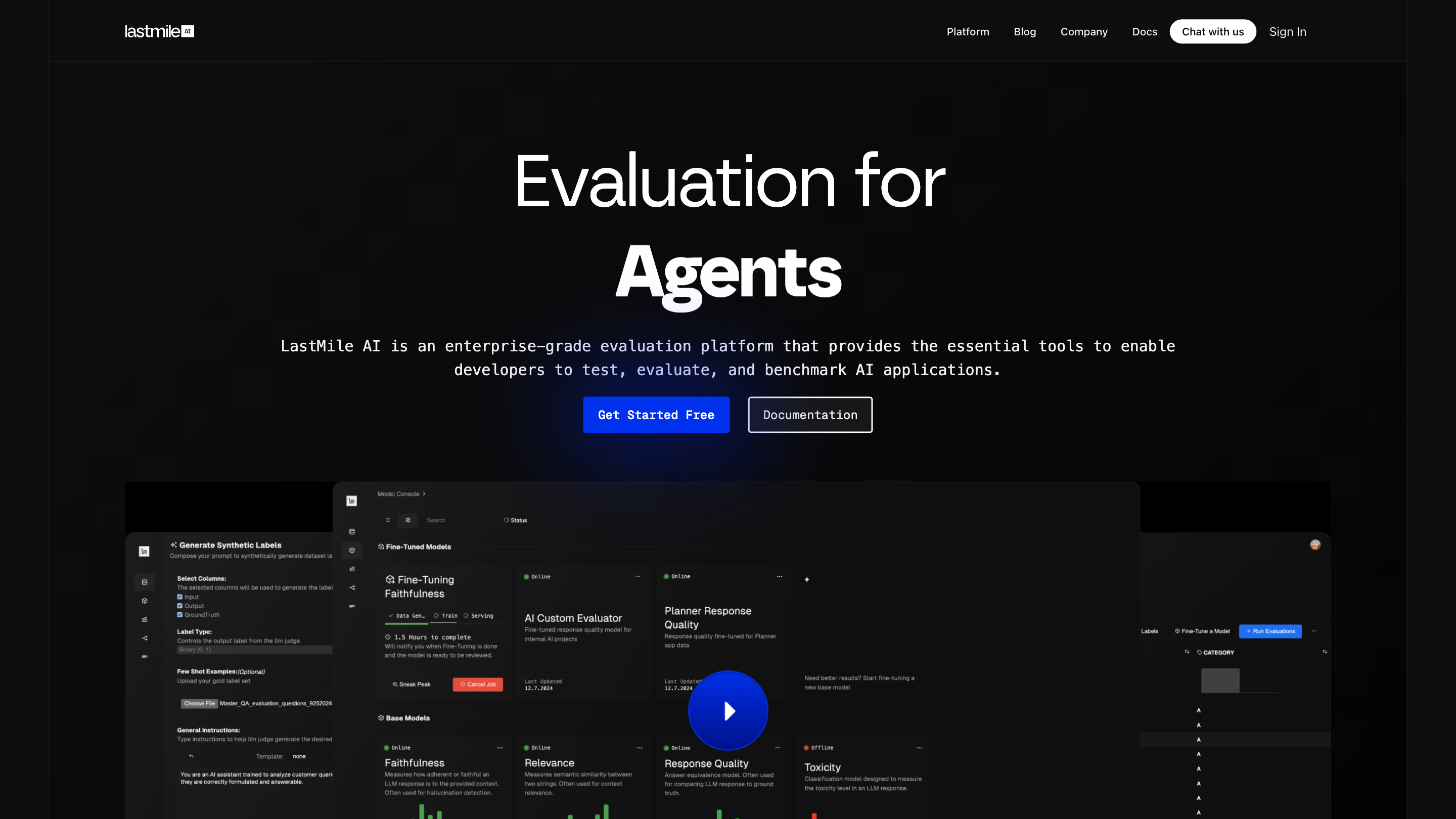LastMile AI
Open siteIntroduction
Generative AI made easy for engineering teams.
LastMile AI Product Information
LastMile AI AutoEval — Generative AI Evaluation Platform is an enterprise-grade platform designed to help developers test, evaluate, and benchmark AI applications. It ships with battery-included evaluation metrics for RAG and multi-agent AI, along with fine-tuning capabilities to design custom evaluators. The platform emphasizes reproducibility, private deployment, and real-time evaluation at scale.
How it works
- Install and integrate: Quick-start with code examples for Python and TypeScript.
- Run evaluations: Use built-in metrics or your own custom evaluators to measure how well your AI system performs on real-world tasks.
- Fine-tune evaluators: Train evaluator models tailored to your data distribution and evaluation criteria.
- Deploy securely: Run AutoEval in Private Virtual Cloud or on your own infrastructure with robust data governance.
- Monitor in real time: Real-time inference, guardrails, and continuous monitoring for production-grade reliability.
Core Capabilities
- AutoEval Out-of-the-Box Metrics for RAG and multi-agent AI applications
- Fine-tuning service to design your own evaluators
- Real-time AI evaluation with blazing-fast inference
- Private deployment options (Private VPC / On-Prem) for data security and compliance
- Synthetic data generation to automate labeling and reduce manual effort
- Reproducible experiment management to accelerate innovation
- Custom metrics support to capture nuanced evaluation criteria
- Guardrails and proactive monitoring to detect anomalies and mitigate risks
- Cross-language client examples (Python and TypeScript) for easy integration
- Scalable evaluation runs and large-scale data support
How to Use AutoEval
-
Python example (pip install lastmile):
-
from lastmile.lib.auto_eval import AutoEval, BuiltinMetrics
-
client = AutoEval()
-
result = client.evaluate_data( data=pd.DataFrame({"input": ["Where did the author grow up?"], "output": ["France"], "ground_truth": ["England"]}), metrics=[BuiltinMetrics.FAITHFULNESS] )
-
TypeScript example:
-
const { AutoEval, BuiltinMetrics } = require("lastmile/lib/auto_eval");
-
const client = await AutoEval.create();
-
const result = await client.evaluateData({ data: [{ input: "Where did the author grow up?", output: "France", ground_truth: "England" }], metrics: [BuiltinMetrics.FAITHFULNESS] });
-
Custom metrics: Upload app data, define your own evaluator models, and fine-tune as needed.
Feature Highlights
- Out-of-the-Box metrics for evaluation of RAG and multi-agent systems
- Fine-tuning of evaluator models to align with app-specific criteria
- Real-time evaluation with ultra-low latency inference
- Private deployment options for data control and regulatory compliance
- Synthetic data generation to automate labeling and data creation
- Reproducible experiment management for reliable results
- Custom metrics and custom evaluator support for bespoke needs
- Guardrails and continuous monitoring to proactively manage risk
- Cross-language SDKs (Python and TypeScript) for seamless integration
- Scalable evaluation workflows with support for large datasets
Why Choose AutoEval
- Trustworthy, production-ready evaluation tooling designed for real-world AI systems
- End-to-end workflow from data generation to evaluation and monitoring
- Flexible deployment models to meet enterprise security, privacy, and compliance requirements
- Accelerates AI innovation by reducing manual labeling and accelerating experimentation
Safety and Deployment Considerations
- Deploy within your own private cloud or on-prem to maintain data sovereignty
- Use synthetic data generation to minimize exposure of sensitive information
- Implement guardrails to detect and mitigate risky model behaviors in production
Quick Start Resources
- Official documentation and API guides
- Examples and tutorials for AutoEval in Python and TypeScript
- Pricing tiers including no-cost entry for quick experimentation
